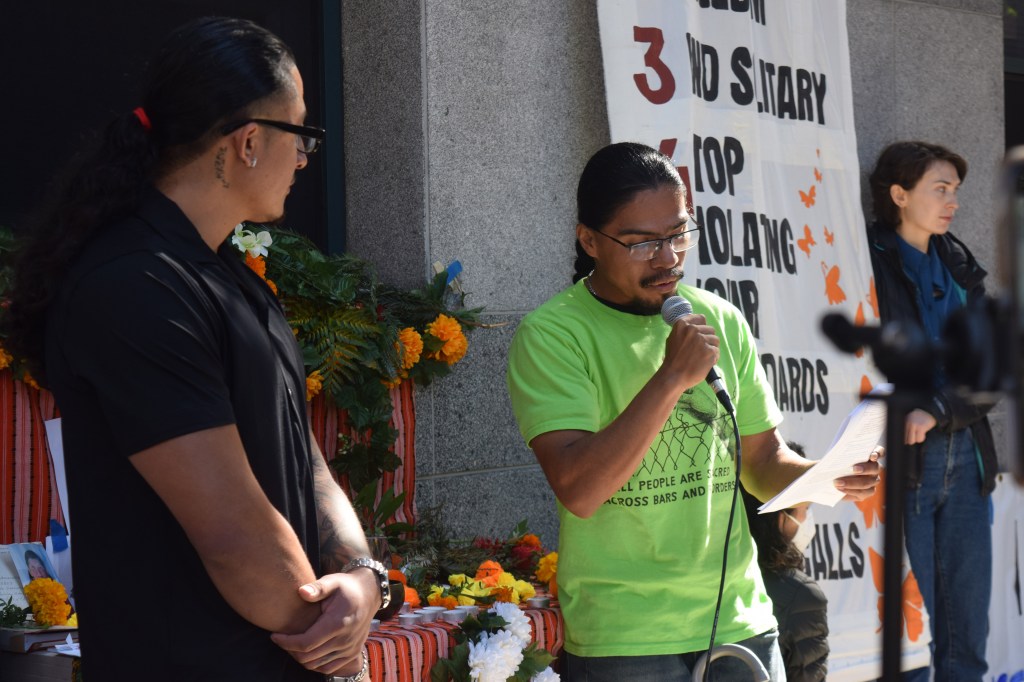GEO Group, one of the nation’s largest private prison contractors, filed a federal lawsuit last month against California officials to strike down a state law allowing local public health officials to inspect immigration detention facilities.
The Florida-based company argued in a filing that California’s law, signed by Gov. Gavin Newsom in August, is unconstitutional because it steps on the federal government’s authority to manage detention centers. By extension, GEO claimed intergovernmental immunity as a contractor.
“This case involves the latest in a string of attempts by the State of California to ban federal immigration enforcement in the state, or so significantly burden such efforts as to drive federal agencies and contractors involved in that constitutionally mandated national security function from California,” according to the lawsuit filed in the U.S District Court for the Eastern District of California.
GEO spokesperson Christopher Ferreira did not respond to requests for comment. The lawsuit names Newsom, state Attorney General Rob Bonta, and Kern County health officer Kristopher Lyon as defendants. All three declined to comment. A first hearing is scheduled for February.
GEO Group could expand its grip on immigration detention facilities now that former President Donald Trump won a second term. Trump has promised a mass deportation of immigrants living in the U.S. without authorization, and investors sense Trump’s policies will create a boon for private prison companies such as GEO. GEO’s stock skyrocketed, increasing 75%, after Trump’s victory.
People and groups associated with the private prison giant spent roughly $5.6 million on lobbying and donations this past election cycle, much of it going to conservative political action committees, including $1 million to Make America Great Again Inc., according to OpenSecrets, a nonprofit that tracks campaign finance and lobbying data.
César García Hernández, an immigration law professor at Ohio State University’s Moritz College of Law, said a judge will most likely block implementation of the California law while litigation is pending. In March, a federal judge blocked Washington state from enforcing most of a law to increase oversight and improve living conditions at that state’s only private immigration detention facility.
“GEO has been rather successful in turning to the courts in order to block access to its facilities,” García Hernández said. “The private prison company is trying to insulate itself by taking cover under the fact that it is operating this facility under contract with the federal government.”
California’s bill grants local public health officers, who routinely inspect county jails and state prisons, the ability to inspect private detention facilities, including all six federal immigration centers in California. Detainees have complained of health threats ranging from covid-19, mumps, and chickenpox outbreaks to contaminated water, moldy food, and air ducts spewing black dust.
State lawmakers have attempted to regulate immigration facilities with mixed results.
In 2019, Newsom, a Democrat, signed a measure banning private prisons and detention facilities from operating in California. But a federal court later declared the law unconstitutional, saying it interfered with federal functions.
In 2021, California lawmakers passed a bill requiring private detention centers to comply with state and local public health orders and worker safety and health regulations. That measure was adopted at the height of the covid-19 pandemic, as the virus tore through detention facilities where people were packed into dorms with little or no protection from airborne viruses.
Under the new law, public health officers will determine whether the facilities are complying with environmental rules, such as ensuring proper ventilation, and offering basic mental and physical health care, emergency treatment, and safely prepared food. Unlike public correctional facilities, which are inspected every year, health officers will inspect private detention centers as they deem necessary.
Supporters say public health officers are well positioned to inspect these facilities because they understand how to make confined spaces safer for large populations.
But GEO argued that California health codes and regulations aren’t always consistent with federal standards.
The lawsuit pointed out, for instance, that California requires detainees at risk of self-harm or suicide to be transferred to a mental health facility. But Immigration and Customs Enforcement rules grant detention centers more discretion, allowing them to transfer a detainee to a mental health facility or keep them in suicide-resistant isolation at the detention center through monitoring every 15 minutes. GEO also warned in its complaint that implementing the law could cost up to $500,000.
Immigrant advocates say the federal government has done a poor job ensuring health and safety. In a paper published in June, researchers showed that immigration officials and a private auditor conducted inspections infrequently — at least once every three years — and provided limited public information about deficiencies and if or how they were addressed.
In response, detainees have filed suits alleging crowded and unsanitary conditions; denial of adequate mental and medical health care; medical neglect; and wrongful death by suicide.
“Why shouldn’t they let an inspector go inside the facilities if they are abiding by the standards,” said Jose Ruben Hernandez Gomez, who was detained for 16 months and released in April 2023. “If they have nothing to hide, they shouldn’t be filing a lawsuit.”
Hernandez Gomez went on a hunger strike for 21 days after filing dozens of grievances alleging abusive treatment and poor sanitation.
Last month, eight members of California’s congressional delegation urged the Department of Homeland Security to end its contracts with two GEO-operated immigration centers, Golden State Annex and Mesa Verde ICE Processing Center, where multiple hunger and labor strikes were held this year. Strikers demanded an end to inadequate medical and mental health services, poor living conditions, and solitary confinement.
Advocates fear GEO’s legal victories could be dangerous for the health of immigrants.
After Washington state’s Department of Health was denied access to the Northwest ICE Processing Center, the state’s only immigration center, two people died in the facility, including one in October.
